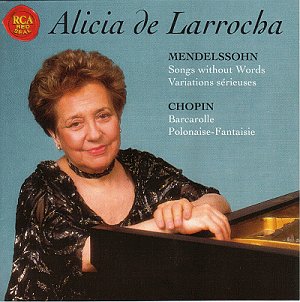This is a well-planned and thoughtful recital, showing
two near exact contemporaries in full command of their genius, and illustrating
differences as well as similarities in style. It has taken some years
to hit the shops (I’ve no idea what the delay has been), and this fine
artist is always worth hearing. Indeed, one of the favourite Mozart
discs of my collection is Larrocha and the Vienna Symphony under Uri
Segal, playing K.482 and 459, sparkling, fleet-fingered renditions that
I return to often. The chief problem here is that little of that sparkle
is evident, and comparisons with some of her illustrious competitors
finds her playing a little wanting in certain areas that are important
for a fuller enjoyment of both composers.
To start with Mendelssohn, the basic selection of music
is nicely representative of the composer, with gorgeous, finely-spun
melodies juxtaposed with more weighty fair. Larrocha’s rendition of
the opening Op. 19 Song without Words is certainly poetic, the
wistful main theme nicely shaped. But turning to Perahia (his Sony recital)
shows an element of fantasy and romantic temperament that is missing
on the RCA disc. This vital extra edge is absent throughout most of
the remaining Mendelssohn, her Spinning Song showing a technique
that has become slightly too careful for this virtuosic piece. I certainly
enjoyed Larrocha’s Variations sérieuses, where the ‘stately’
approach to the Bachian main subject is appropriate. But again, listening
to Perahia (on an earlier all-Mendelssohn Sony disc) shows the American
in much fuller command of a wide tonal palette; the tricky octaves of
variation 3 (piu animato) are heroically despatched, and he is
able to achieve a true allegro vivace in variation 8.
As I say, there is much to enjoy in the slower, more
introspective sections of Larrocha’s disc, but one feels a whole dimension
is missing.
The Chopin half of the disc shows this to an even more
cruel degree. Take the Barcarolle, a late masterpiece and one
of Chopin’s finest inspirations. I have a number of recordings of this
work, and all somehow managed to dig a little deeper below the surface
than Larrocha. My current favourite is Dinu Lipatti, showing how tempestuous
the piece can be, despite its obvious layer of charm. Of modern versions,
Krystian Zimerman gives a truly inspirational account (on DG) that again
shows the multi-layered nature of Chopin’s vision; he is also able to
point up the harmonic daring that is subtle and needs teasing out. I
do like Larrocha’s way with the limpid beauty of the Berceuse,
and she keeps a steady pulse instead of too much rubato mauling,
not always easy in this deceptive piece. Her Nocturne is a might
‘safe’, and her Polonaise-Fantasie is somehow missing what the
composer is wanting in his title – fantasy. Try Pollini (usually
criticized for being too cold and unfeeling) on his DG set of Polonaises,
and one enters a different world.
All this sounds very unkind to a great artist, but
in oft-recorded repertoire such as this, and at full price, one has
the right to expect new insights. I’m afraid we get safety first, with
any poetic vision or fiery temperament only fleetingly glimpsed. Fans
of the pianist will no doubt want this disc anyway, and the recorded
sound is very good indeed, but lovers of the music will ultimately get
greater rewards elsewhere.
Tony Haywood


![]() See
what else is on offer
See
what else is on offer 